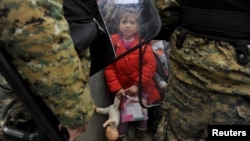New border controls in the western Balkans are leaving migrants stranded behind barbed wire as temperatures start to plunge, and aid agencies warned on Friday that the clampdown would lead to a rise in smuggling.
Balkan countries have begun filtering the flow of migrants, granting passage to those fleeing conflict in the Middle East and Afghanistan, but turning back thousands from Africa and Asia.
The measures by Macedonia, Serbia and other states are creating tension at border crossings and leaving some families stranded without adequate shelter, the U.N. refugee and children's agencies and the International Organization for Migration (IOM) said in a joint statement.
On Macedonia's southern border with Greece, crowds of people were backed up, denied entry. Standing behind barbed wire, some had scrawled on cardboard, "Pakistani people want freedom" and, "We are Bangladeshi, save our life."
"There is urgent need to put in place additional reception capacity at the points of entry," Adrian Edwards, spokesman for the U.N. High Commissioner for Refugees (UNHCR), told a news briefing in Geneva.
"When you have numbers of people backing up at any one of these points, you have a problem with insufficient accommodation and that as we head into winter is a serious, serious worry," he said.
More than 4,000 refugees and migrants have streamed into Europe each day in November, adding to the influx of 846,000 people — many of them Syrians fleeing war — who have crossed the Mediterranean this year, according to the UNHCR.
Winter arriving
The International Federation of Red Cross and Red Crescent Societies warned of the threat of plunging temperatures.
"Winter looks set to arrive in the next few days, putting lives at risk," said Europe director Simon Missiri.
Macedonia defended its actions and warned the European Union it should not treat the country as a "buffer zone" where 'economic migrants' would be stranded.
Visiting Hungary on Friday, Prime Minister Nikola Gruevski said Skopje was looking to how Budapest handled the crisis.
Hungary threw up a 3.5 meter-high fence, effectively closing its southern border to migrants and refugees. Gruevski's conservative government has started preparatory work for a possible fence of its own.
"We talked about how Hungary has dealt with all of this, because it is obvious we face a period where we will have more serious challenges," Gruevski told a news conference with Hungary's right-wing Prime Minister, Viktor Orban.
The measures have led to concerns that migrants might change routes via Bulgaria, where "Wild West" conditions are even more precarious, IOM spokesman Joel Millman said.
IOM regional director Gianluca Rocco predicted that smuggling will drastically increase, together with the number of fake Syrian travel documents on the black market.





